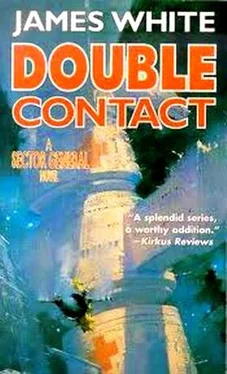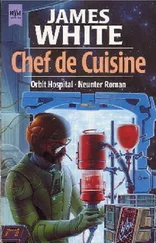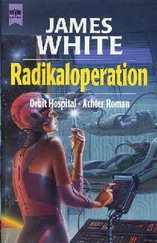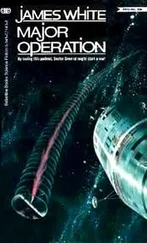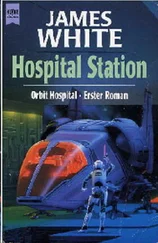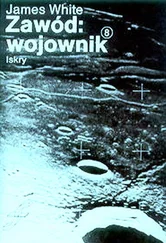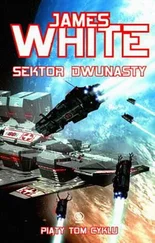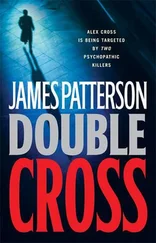“… is possibly responsible for causing the casualties on the first ship,” Prilicla went on firmly. “Or perhaps another, undistressed vessel or vessels in the area have caused both sets of casualties. We must prepare and organize now for that eventuality, beginning with a clarification of the chain of command.”
For several minutes nobody spoke. The level of their emotional radiation increased in strength and complexity, but not to a stage where it was affecting him physically. The three Monitor Corps officers were reacting with controlled restraint in the face of possible danger, the feelings characteristic of the military mind. Murchison’s radiation was complex and negative, as was Naydrad’s, but neither of them were feeling strongly enough to vocalize their objections. Unlike the others who were feeling minor non-specific anxiety and uncertainty, Danalta projected the calm self-assurance of a shape-changer who felt itself to be impervious to all forms of physical injury.
“Normally,” Prilicla went on, “friend Fletcher here is in operational command of Rhabwar until it arrives at a disaster site, after which it is the senior medical officer, myself, who has the rank. But on this mission it may well be that, initially at least, military tactics will be of more benefit to us than medical expertise. I feel your agreement, friend Fletcher, and also that you are wanting to speak. Please do so.”
— The captain nodded. “Have you and the other medics considered the full implications of what you are saying? I realize that at present all this is pure speculation, but in the event of our being faced with a situation of armed conflict, difficult — and to all you medics, disagreeable decisions will have to be taken, and orders issued by myself. If I am called on to make those decisions, my orders will have to be obeyed without question or argument, no matter how objectionable they will seem. This must be fully understood and accepted by everyone right now — before, and not during or after, the event. Is it?”
“At any space accident or surface disaster scene, that is how we obey Dr. Prilicla,” Naydrad said, its fur and feelings projecting puzzlement. “This is normal procedure for us. Why are you stressing the obvious? Or am I missing something?”
“You are,” said the captain, its emotional radiation as well as its voice quiet and under control, as it spoke words it was feeling an intense reluctance to say. “This ship is unarmed, but not without weapons of defense and offense. Lieutenant Chen.”
The engineering officer cleared its breathing passages noisily and said, “For a limited duration, no more than a few hours, our meteorite shield can be stiffened sufficiently to give protection against shrapnel from missiles tipped with chemical-explosive warheads. But if one was tipped with a nuclear device, we wouldn’t have a prayer.”
Lieutenant Haslam, whose astrogation speciality included long- and short-range ship handling, joined in without being asked. It said, “My tractor-pressor beam array, which is normally used on wide focus for docking or pulling in space wreckage for closer examination, can be modified to serve as a weapon, although not a very destructive one. Providing we can control the distance of the object and precisely match its speed, the pressor focus can be narrowed to within a diameter of a few feet to punch a hole in the opposition’s hull plating. The catch is that it would increase the already heavy meteorite-shield drain on our power reserves, the shields would go down, and we’d be defenseless against whatever form of nastiness the opposition wanted to throw at us.”
“Thank you, Lieutenant,” said the captain. To the others it went on, “So you can see that we are poorly equipped for a military operation. The point I am making is that, should we encounter a situation of armed conflict or its aftermath, I shall assess the tactical picture and the decisions thereafter will be mine. These will include an immediate withdrawal to the safety of hyperspace if the action is still in progress. If not, and if there are damaged vessels in the area which I consider incapable of threatening our ship, I shall take, but not necessarily follow, the advice of the senior medical officer regarding the choice of which set of survivors, if any, is to be recovered first. These should be the Monitor Corps Earth-humans rather than the new, other-species casualties because—”
“Captain Fletcher!” Murchison broke in, its words accompanied by an explosion of shock and outrage that made Prilicla feel as if he had flown into a solid wall, an effect reinforced by the emotional reactions of the other medics. “That is not what we do here!”
The captain paused for a moment to order its own thoughts and feelings, which closely resembled those of its listeners, then continued quietly. “Normally, it is not, ma’am. I was about to say that there are sound tactical and psychological reasons for rescuing our own people first. They at least know who and what we represent and can furnish us with current intelligence regarding the situation, while the other people will be confused, frightened, and probably injured aliens who will take one look at us—” he glanced quickly at the medical menagerie around him—
“and feel sure that we mean them harm. You must agree that it would be better to know something about the strangers, however little, before attempting to rescue and treat them.
“In the event,” it went on, looking up at the hovering Prilicla, “the decision and choice may not be necessary. But if it is, the med team must be prepared to treat the casualties in the order I designate. Is this clearly understood?”
It was, Prilicla knew, because there were no strong feelings of negation coming from anyone, and the surrounding emotional radiation was settling down to a level which enabled him to maintain a stable hover. It was Naydrad, their specialist in heavy rescue, who broke the lengthening silence.
“If nobody has anything else to add,” it said with an impatient ripple of its fur, “I for one want to review the medical log and space-rescue techniques. After six months in the hospital where all the patients are neatly stretched out in beds or whatever, one gets a little rusty.”
Without saying anything else, the captain left the casualty deck, closely followed by the two junior officers. Naydrad began running a visual summary of Rhabwar’s early missions and the often unorthodox rescue techniques involved while recovering casualties. Murchison and Danalta joined it before the screen, probably because it was the only thing that was moving, apart from Prilicla’s wings. Their emotional radiation was complex but firmly controlled as if they might be holding back the urge to say something. Prilicla excused himself and flew up the central well to his quarters so as to have the opportunity of thinking without the close proximity of outside emotional interference — and, of course, to give them the chance to relieve their feelings verbally. This is not what we do here,” Murchison had said.
He did not need Naydrad’s viewscreen to remind him of all the things they had done on Rhabwar, including the rules they had broken or seriously deformed, because the memories were returning as sharp, clear, and almost tactile overlays on the flickering grey blur of hyperspace outside his cabin’s viewport. Prilicla had an outstandingly good memory.
He began with the briefing on operational philosophy before the first and supposedly routine shakedown cruise. It had been explained that over the past century the Monitor Corps, as the Federation’s executive and law-enforcement arm, had been charged with the maintenance of the Pax Galactica, but because the peace they guarded required minimum maintenance, they had been given additional responsibilities and an obscenely large budget for stellar survey and exploration. In the very rare event that they turned up a planet with intelligent life, they were also given responsibility for the delicate, complex, and lengthy first-contact procedures. Since its formation, the Corps’ other-species communications and cultural-contact specialists had found three such worlds and established successful relations with them, to the point where they had become member species of the Federation.
Читать дальше
